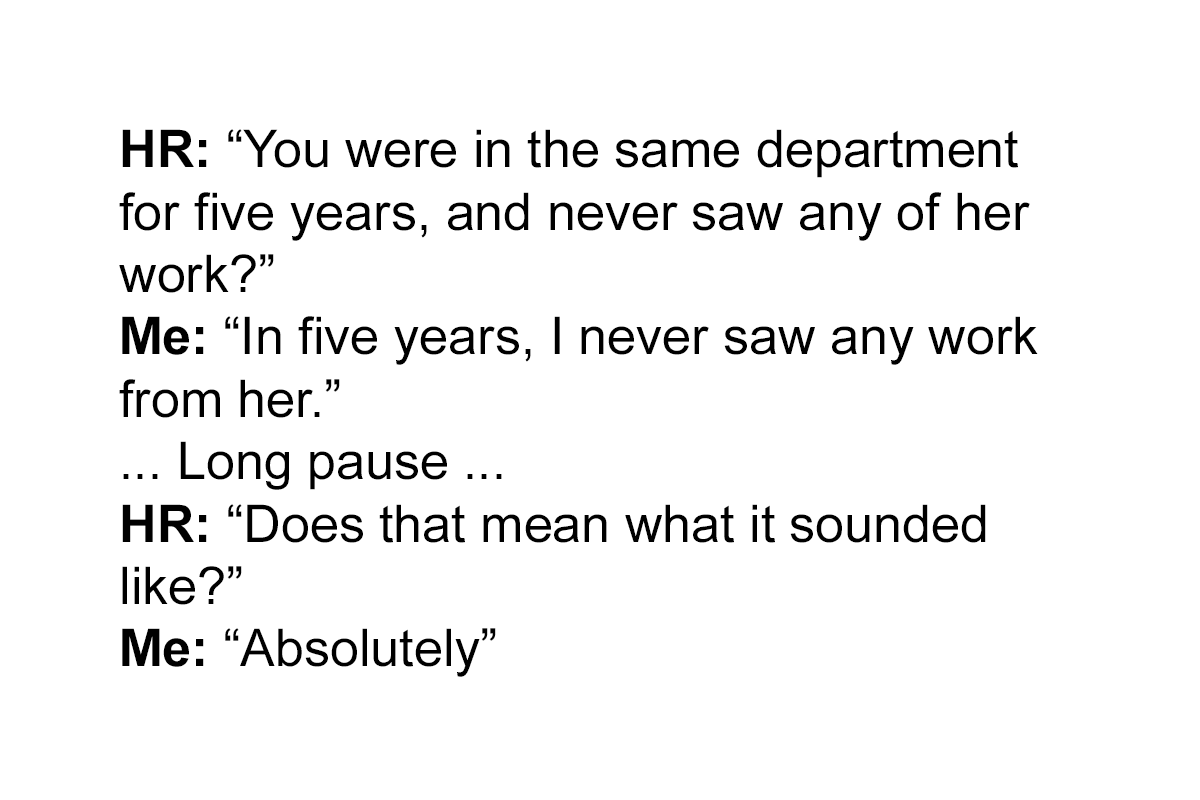
Man Is Shocked To Receive Call From HR Asking For A Reference Check On Notoriously Lazy Ex-Coworker, Doesn’t Hold Back
The thing about any company is that it’ll have its fair share of genuinely hard workers and complete slackers, with a bunch of people who fall somewhere in the middle. Unfortunately, not everyone is able to pull their weight. And these free-riders can make a lot of their colleagues feel resentful.
Case in point, redditor u/BuddhaMcDonald shared how his former colleague, a complete layabout who he called Ms. Novelreader, tried to get a job reference from him. He recounted the phone call he had with a human resources representative in a hilarious post on r/pettyrevenge.
Bored Panda reached out to workplace expert Lynn Taylor, the author of ‘Tame Your Terrible Office Tyrant’ and the head of the fashion brand ‘Behind the Buckle,’ to better understand why it is that people resent their colleagues so much if they’re slacking, and what can be done about it. Read on for our full interview. Bored Panda also got in touch with u/BuddhaMcDonald and we’ll update the article once we hear back from him.
It’s normal to get mad when your coworkers don’t pull their own weight. Sometimes, it takes karma a while to catch up
Image credits: halfpoint (not the actual photo)
A guy recounted how his lazy ex-coworker said that he’d give her a job reference. Things didn’t turn out as she had hoped
Image credits: KostiantynVoitenko (not the actual photo)
Here’s how the conversation about Ms. Novelreader went between the man and the HR rep
Image credits: BuddhaMcDonald
The HR rep probably didn’t expect to hear the truth about the job candidate
If you search your feelings, you know one thing to be true: you probably dislike those of your coworkers who spend most of their day browsing social media, taking endless coffee breaks, and doing everything they can to avoid work.
The worst part? Probably no one calls them out (because, hey, who wants to start up massive drama at the office?). They end up earning their wage while putting in less effort than you. Frankly, it’s unfair. And it’s all right to get mad.
Equality and a sense of fairness are very important to people, whether we’re talking about office work or school. That’s why many of us (silently) lash out at those in power who pick favorites who they then reward even when they don’t get the results that they should.
Image credits: DragonImages (not the actual photo)
Fairness is something that many employees value in the workplace
According to workplace expert Taylor, the author of ‘Tame Your Terrible Office Tyrant,’ it’s natural to resent colleagues who advance in their career without putting in any extra effort.
“Everyone goes into a work environment believing they’re on a level playing field—and that hard work and results mean success. But unfortunately, that isn’t always the case,” she told Bored Panda.
“Sometimes there doesn’t appear to be any rationale, or visible contribution by the colleague to the business that would warrant raises or promotions.” Meanwhile, favoritism is often the culprit. Unfortunately, for employees, this sort of management practice can be both disheartening and demotivating.
“It creates the sense that it doesn’t matter how hard you work, because politics and connections trump all of that. Consequently, employees don’t see any reason to go the extra mile. And the result is bad for everyone, as productivity plummets,” Taylor said.
Image credits: LightFieldStudios (not the actual photo)
Meanwhile, Bored Panda was interested in some of the potential approaches to dealing with free-riders in the workplace. Workplace expert Taylor shared some of the productive steps that employees can take to tackle these issues, and revealed the pitfalls to avoid as well:
- “One thing you never want to do is approach the person directly. You may start an unnecessary confrontation that will make your productivity ultimately suffer. When you have a grievance you must back it up with facts, otherwise, you might be accused of sour grapes relative to your colleagues’ successes.
- Have you done your homework—that is, is it possible your ‘slacker’ coworker has kept their accomplishments under the radar? Have you consulted other employees who are in the know? Make sure you’re extremely familiar with their activities and contributions (or lack thereof!).
- Depending on your relationship with your boss, try to have a one-on-one, non-threatening discussion, with your facts ready. You might say you love your job, and are always striving to advance. That you don’t like comparing yourself to others, but want to know some specific efforts John is undertaking that you could learn from—and could help you make a greater contribution. Give specific examples of your concerns about the employee, and how it’s impacting the motivation of others. Make it known that this may just be an impression that you and others have (which will help your manager save face). Consider approaching your manager with one or more fellow colleagues who share your view and concerns. There’s power in numbers.
- If approaching your manager fails and the situation is untenable, consider speaking with the HR department, ideally with other supportive coworkers. Just understand that may well get back to your boss and create conflict. The HR department may facilitate your moving to a different role within the company, as one potential outcome.
- Finally, consider whether the situation is so demotivating and seemingly unfair that you would do better in a more equitable corporate culture. For example, are there other things about the job you dislike? Is it time for a change, regardless?
According to Taylor, the author of ‘Tame Your Terrible Office Tyrant,’ there’s a fine line when complaining to your boss about a practice they’re undertaking. As an employee, you have to weigh the risks and rewards.
“In general, it’s better to be open and communicative, than to suffer in silence or just leave. In many ways, you have nothing to lose by voicing your concerns diplomatically, especially in today’s strong employment environment.”
Consistently remind your boss how valuable you are
It can be heartbreaking and demotivating to see someone get promoted for being mediocre and then spend the entire workday, say, reading novels with their feet on their desk. Why bother doing your job well if there’s clearly no link between effort and reward?
The harsh reality is that unfairness is an inevitable part of life. Not everyone who prioritizes their job or burns the midnight oil will get a raise and a cozy corner office. Meanwhile, not everyone who slacks off will get caught and punished for it, for example, if they’re good at pretending to work or know how to butter up their boss with their silver tongue.
Image credits: traimakivan (not the actual photo)
Often, the most powerful weapon when dealing with unfairness is open and honest communication. There’s nothing like shining the spotlight on something that others would prefer to remain in the shadows. If you see that a coworker is clearly being lazy (and rewarded for it), one avenue you can consider is talking to them directly, but this is an extremely risky venture. You could potentially sit down for a quick friendly chat about how their attitude affects everyone at the office. But remember to attack the problem, not the person. Otherwise, they might get defensive and you’ll get nowhere. There’s a lot of potential drama and fallout waiting on the sidelines in this particular case.
Something else to consider is reaching out to your manager or an HR rep about dealing with unfair workloads. We all like to think that our time is valuable. And if we’re going above and beyond the call of duty but going nowhere, but others are getting raises for working less, clearly there’s a disconnect in values.
Nobody’s saying that you should be a snitch, but you have to try and understand what your manager’s position is: maybe they value people skills more than technical ones in their employees. Or maybe they’re not even aware that there’s been a long-term problem.
If that doesn’t work, you can always try creating some space between your work and your private life. Scale back on the overtime. Learn to prioritize. Stop helping your colleagues with their own tasks. Put yourself first. Or, in other words, quiet quit in the sense that you’re doing the work that you’re paid for, without sacrificing your work-life balance if there’s absolutely nothing in it for you.
The fact is that your superiors will probably only notice your extra effort if you consistently draw attention to it. For instance, by meeting up with them for a semi-annual performance review. It’s your job to remind them of how competent you are and how you get great results. If there’s still no positive feedback, consider looking for a company that rewards merit, not just charisma.
However, keep in mind that what matters at the end of the day is whether or not an employee gets the results they need to get. Working more hours isn’t always better. A survey from 2016 found that UK office workers are only productive for 3 hours each day. How long your actual work day is doesn’t matter much. You shouldn’t be burning yourself out and working overtime just because everyone appears to be doing it. The ‘cult of overwork’ is a real thing and it’s not all that effective. As with most things, there’s a balance to be found between effort and rest.
You’ll probably also agree that you can do a bunch more work far more quickly if you’re not constantly multitasking or distracted by others. There’s nothing wrong with reading a novel to reward yourself if you do your job well. But you really need to do your job well! Otherwise, your coworkers will start resenting you.
Some readers shared their thoughts and similar experiences with free-riders at work
In my past work history, the million dollar question was "Would you rehire them?". Wasn't asking about performance, termination, or specifics. But boy did it get the message across.
When I was a Supervisor for a company and I would make reference calls to companies about possible hire, My first question would be " If you had the chance to hire said person back would you?" The same would apply for giving a reference. In Ontario you were not allowed to make any derogatory remarks about anybody. Your hands are tied to ask/answer any question on work ethic, performance or even playing well with other members in the department. A yes or no answer would seal the fate of ant future/past employee.
Load More Replies...This is why you ask people before using them as a reference, and always make sure it is someone who you know will give a good one. If you are unsure, have a friend make a fake call and see what they say.
Some guys will tell you that it is ok, and will fabricate their reference of you. I'd have another friend call them and pretend to be from another company to see what they say.
Load More Replies...I worked at a nursing home as a CNA years ago. I had a coworker who treated our patients like they weren't Hunan beings. She was not a nice person. She dropped a patient on the floor and as a result, the patient ended up with a broken knee. She was asked to quit instead of getting fired. A few years later I was working for a home health care company. That same lady applied for a job a few months later. They asked me if I knew her and if she was a good employee. I told them everything. Needless to say, she did NOT get the job!
In my past work history, the million dollar question was "Would you rehire them?". Wasn't asking about performance, termination, or specifics. But boy did it get the message across.
When I was a Supervisor for a company and I would make reference calls to companies about possible hire, My first question would be " If you had the chance to hire said person back would you?" The same would apply for giving a reference. In Ontario you were not allowed to make any derogatory remarks about anybody. Your hands are tied to ask/answer any question on work ethic, performance or even playing well with other members in the department. A yes or no answer would seal the fate of ant future/past employee.
Load More Replies...This is why you ask people before using them as a reference, and always make sure it is someone who you know will give a good one. If you are unsure, have a friend make a fake call and see what they say.
Some guys will tell you that it is ok, and will fabricate their reference of you. I'd have another friend call them and pretend to be from another company to see what they say.
Load More Replies...I worked at a nursing home as a CNA years ago. I had a coworker who treated our patients like they weren't Hunan beings. She was not a nice person. She dropped a patient on the floor and as a result, the patient ended up with a broken knee. She was asked to quit instead of getting fired. A few years later I was working for a home health care company. That same lady applied for a job a few months later. They asked me if I knew her and if she was a good employee. I told them everything. Needless to say, she did NOT get the job!

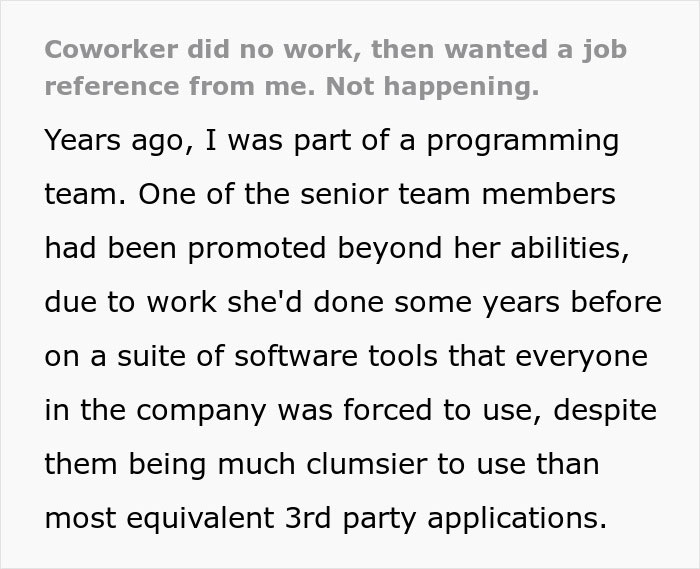
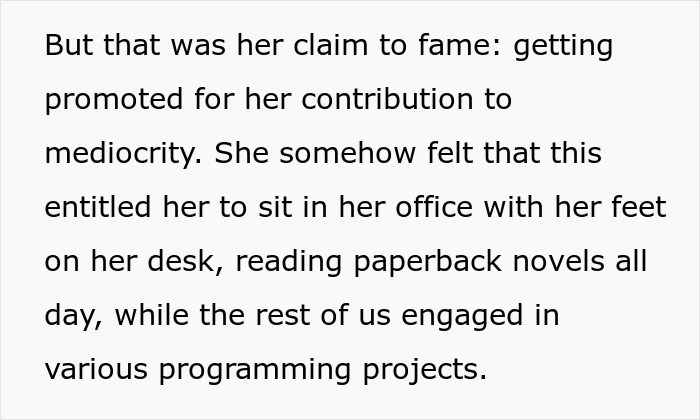
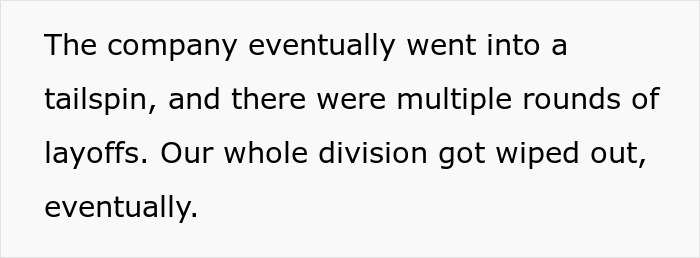


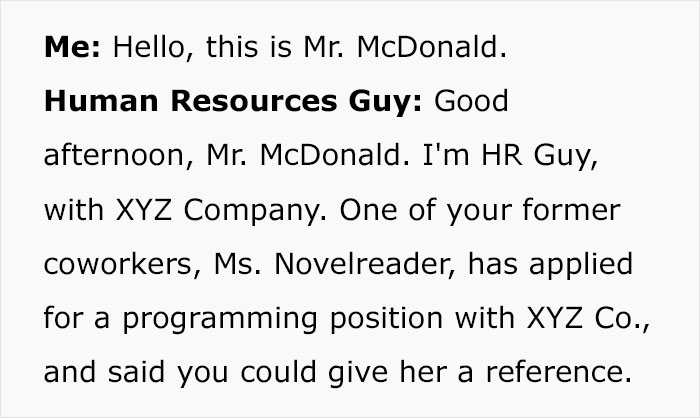
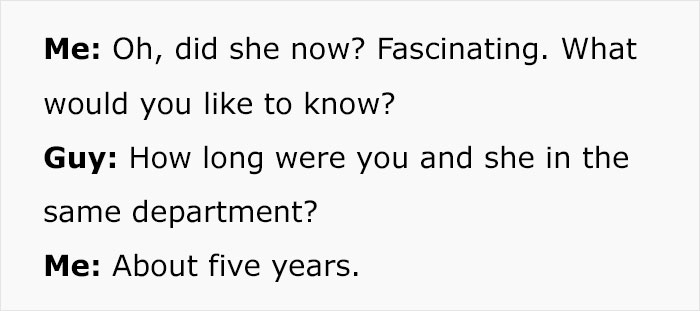
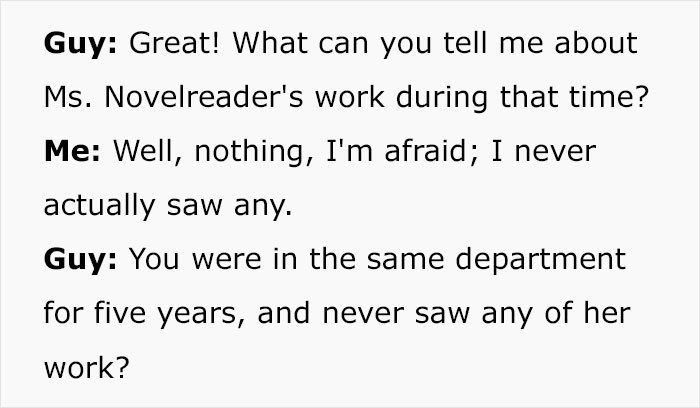
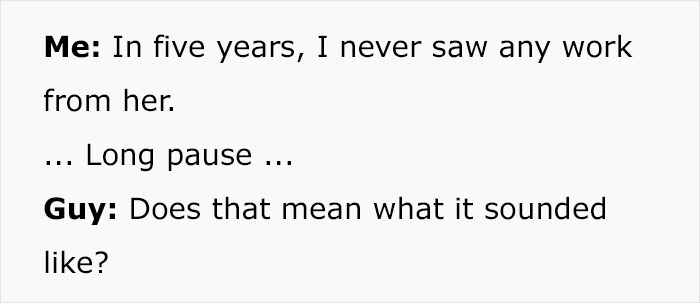





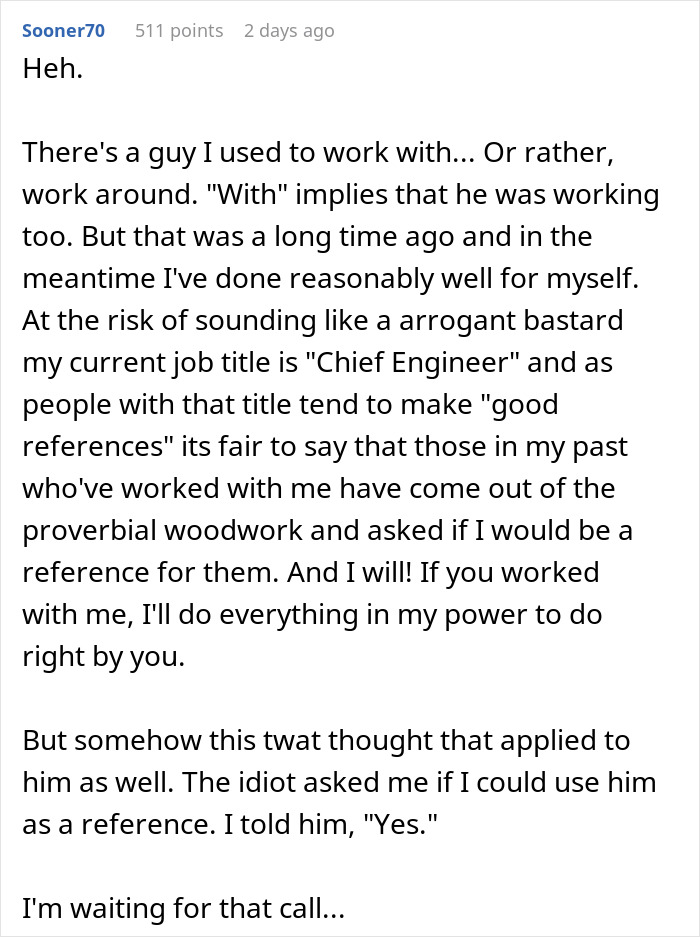
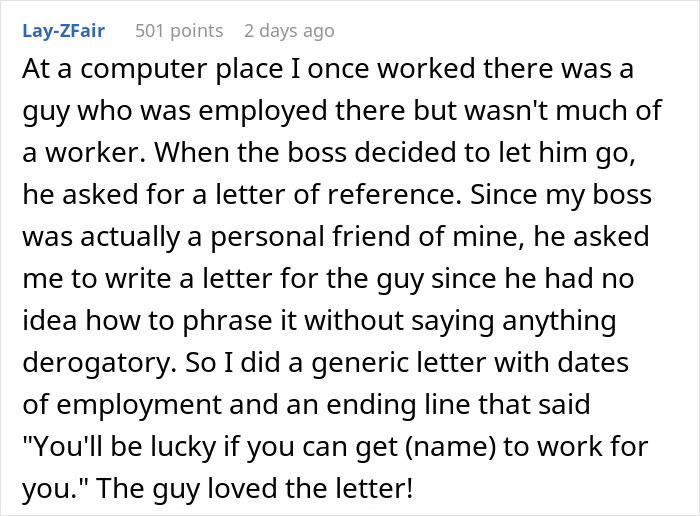

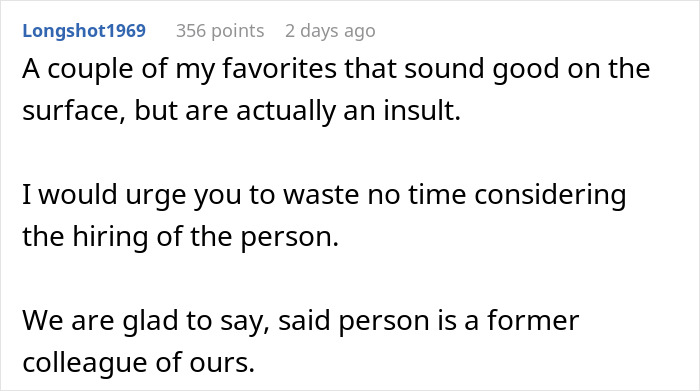

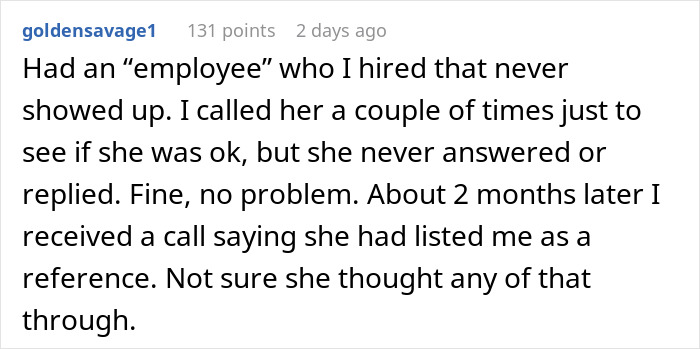
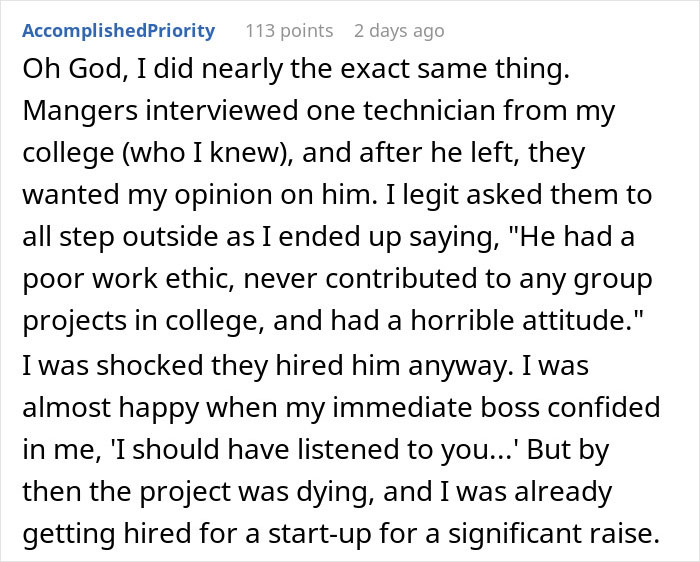

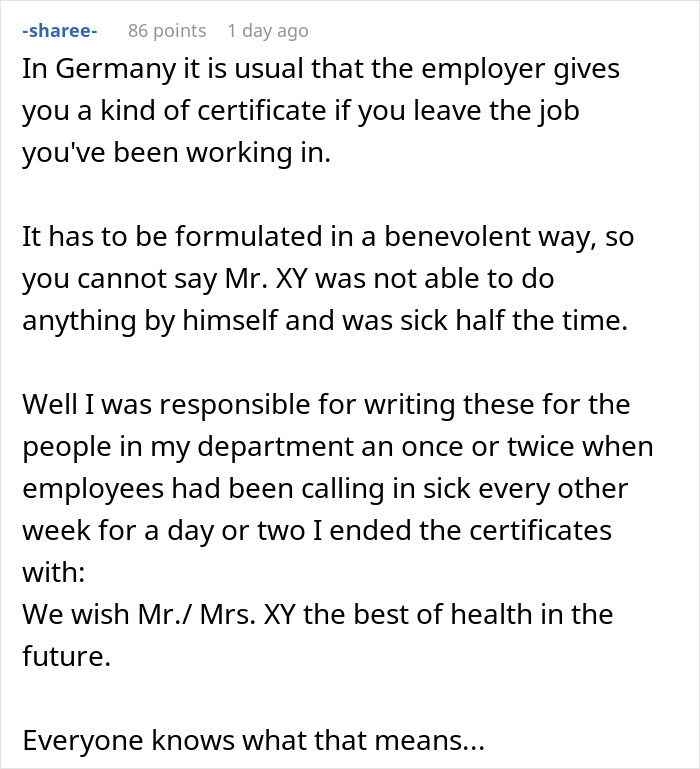
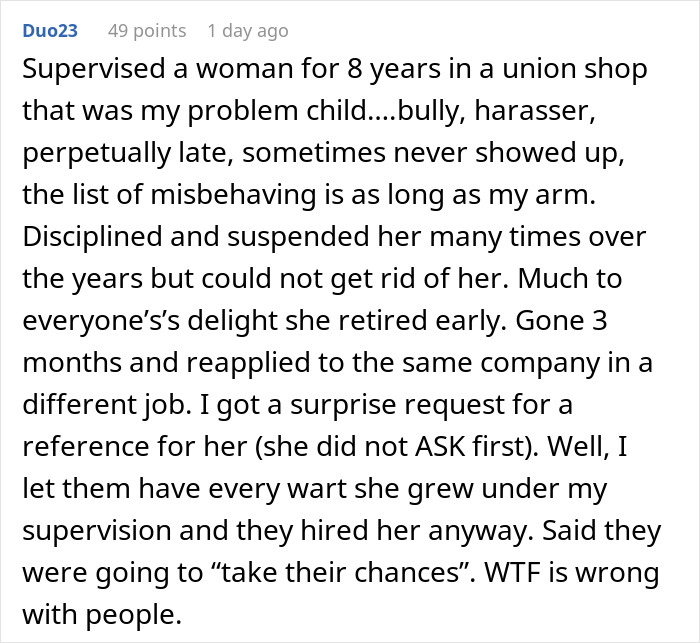





118
128